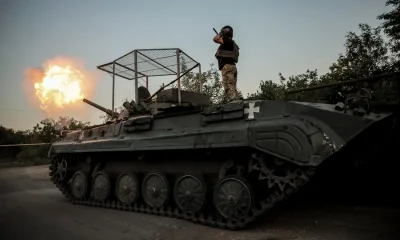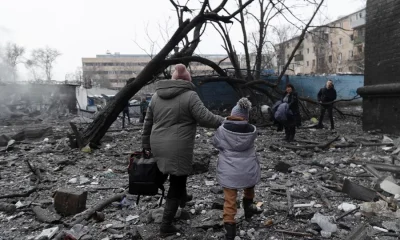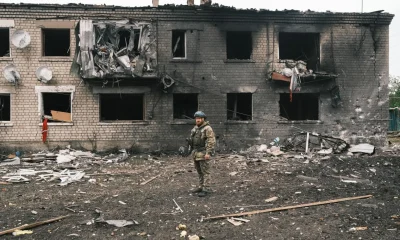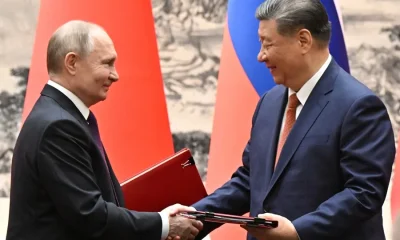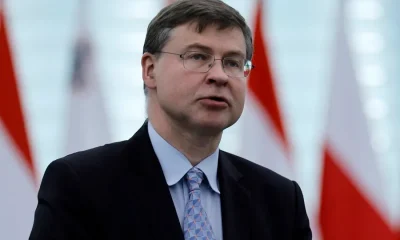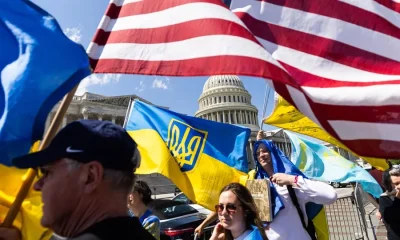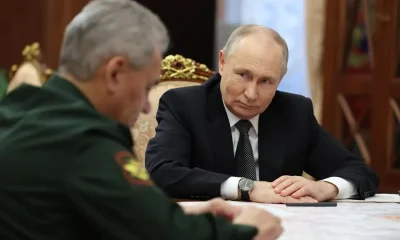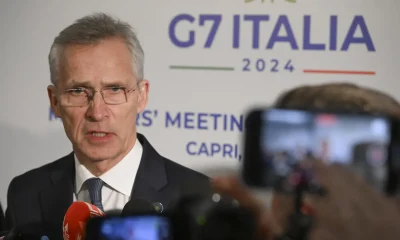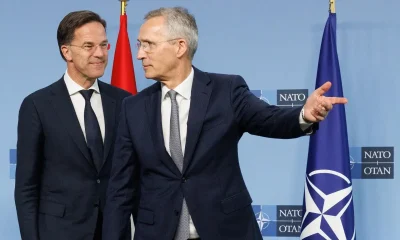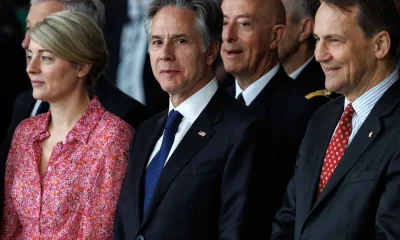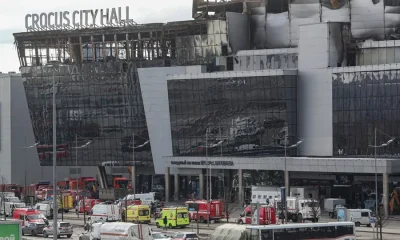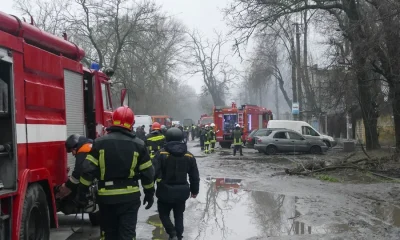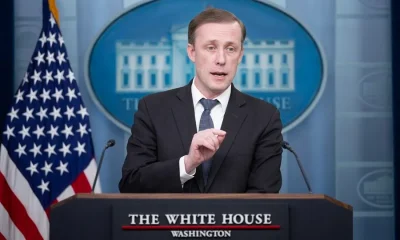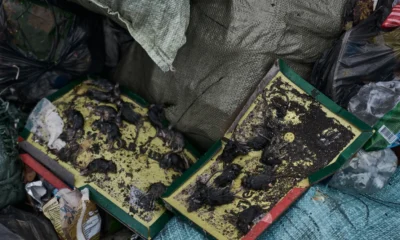International
UN recognizes that there are no conditions for peace in Ukraine
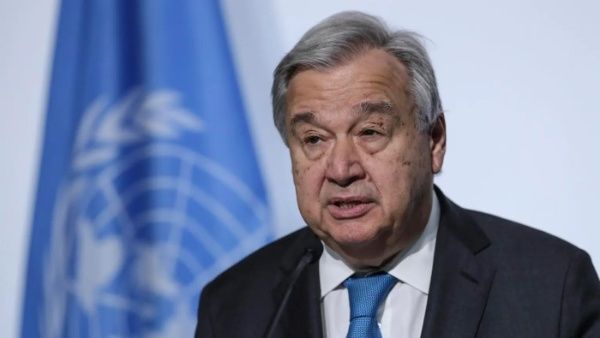
May 9 |
The Secretary-General of the United Nations, António Guterres, said Tuesday that a peace agreement in the conflict in Ukraine is currently impossible while he assured that the UN is striving to maintain dialogue on concrete issues.
The incumbent told Spanish international media after receiving the 16th edition of the Charles V Award on Europe Day that “unfortunately, I believe that at this moment a negotiation for peace is not possible.”
In this sense, Guterres pointed out that both parties to the conflict are convinced that they can win, while he indicated that there is still a long way to go for an eventual peace agreement.
“Peace must never be underestimated or taken for granted. We must work for and for it, every day, without rest,” he said previously at the traditional ceremony held at the Monastery of Yuste, Cáceres.
“In a world that is tearing itself apart, we must heal divisions, prevent escalations, listen to grievances. Instead of bullets, we need diplomatic arsenals,” he added.
Similarly, Guterres referred to the grain deal between Russia, Ukraine, UN and Türkiye while assuring that “we are doing our best to respond better to Russian problems.”
“It is true that the export of food and fertilizers is not under sanction, but there are indirect obstacles that remain and we are trying to remove them,” he acknowledged.
International
“A dignified life” for migrants, the plea in Panama in memory of Pope Francis

Catholics who work with some of the 299 migrants deported by the United States to Panama, beg the Government that beyond placing the flag at half-mast for the death of Pope Francis this week, it should pay tribute to him by giving “a dignified life” to the migrants, as the Supreme Pontiff preached.
“Never forget your human dignity,” because “you are not a discard,” the pope wrote last year in a message addressed to the thousands of migrants who had just crossed the dangerous Darién jungle, the natural border between Colombia and Panama, on their way to the United States.
Known by many as “the pope of migrants” for his defense of those who are forced to leave their land in search of better living conditions, he himself recalled then that he was “son of migrants who went out in search of a better future,” and that “there were times when they were left with nothing, until they went hungry; with empty hands, but their hearts full of hope.”
Therefore, members of Catholic organizations that are part of the CLAMOR Network (the Latin American and Caribbean Ecclesiastical Network for Migration, Displacement, Refuge and Trafficking in Persons), and who work with dozens of migrants in the Panamanian capital deported by the United States, remember the teachings of Pope Francis.
Elías Cornejo, coordinator of social promotion and attention to the migrant population of the Catholic organization Fe y Alegría, which is part of the Clamor Network, explained to EFE in a migrant shelter that we must “look for alternatives for these people, they cannot be kept in conditions that are not favorable or dignified.”
“In the context of the death of Pope Francis, who was incisive in insisting on humane treatment of migrants, I believe that this country that declares itself mostly Catholic (…) beyond the flag at half-mast, I would also ask the national government to dignify that memory of Pope Francis by giving an answer to many people who (…) have the right to have a dignified life,” Cornejo stressed.
“Give them that, try to find a human, Christian, evangelical answer,” he insisted.
The pilgrimage of this group of migrants through Panama began in mid-February, when a total of 299 arrived on three planes from the United States within the framework of an agreement that turned the Central American nation into a “joup” country for their repatriation.
Coming from extracontinental nations such as China, Afghanistan, Sri Lanka, Vietnam, Uzbekistan, Cameroon, Ethiopia, Iran, Russia, Pakistan or Nepal, 188 returned to their countries “voluntarily”, according to the latest official information available, and 111 refused to do so, many of them fearing for their lives.
The entire group was first housed in a central hotel in the Panamanian capital, and those who refused to be repatriated to their countries were transferred to a shelter more than 200 kilometers away, near the Darién jungle.
Then, after the decision last March by the Government of Panama to grant them a temporary humanitarian permit for 30 days, extendable up to 90, to find a way out of their situation, they took them back to the capital, although now without any type of logistical support, so the CLAMOR Network occupied that vacuum by first hosting the migrants in a humble hotel in the city, to transfer them days later to one of its shelters.
According to Cornejo, who underlines the support they receive in the shelter of “non-believing people, believing people, Muslim people, people of other religions too,” of the 69 migrants who moved there – families with children continue to stay in a hotel – 47 remain, since they “make their own decisions and move” by their own decision to other places.
“We don’t know where, we have an idea, but we don’t want to keep them or force them to anything, because they are free, they are not people who are imprisoned (…) We don’t want to pressure them, we don’t want to pressure the Government, but we do want to tell them again, ‘please, let’s find a way out of this’. An exit that has to be worthy for the State and for them, for migrants,” he remarked.
At least, he says, from the Foreign Ministry they have guaranteed that they will not deport anyone by force if the new 60-day period ends, an extension that ends in June and that, according to official data shared with EFE, at least 80 migrants have requested.
Two mothers from Asian countries who requested with their children the extension of the “temporary resident permit for humanitarian reasons”, as indicated in the document to which EFE had access, and who asked for anonymity, insisted that returning to their country is not an option, since if they return their “lives are in danger”.
Housed in a humble hotel in the center of the Panamanian capital, on a floor where behind each door there is a family of different nationality, they explain to EFE through a translation application part of their journey to the United States, crossing several countries of America with their minor children, and then their sudden expulsion without knowing the destination, some handcuffed hand and foot.
“When they put me on the plane I felt suffocated. His hands and feet were cold. My heart was beating fast, I had high blood pressure. I told the military,” recalls one of them. There were men and women handcuffed, the children were terrified. They are adults, but children are not, “how can they treat them as criminals?”
Now, they say, they are “afraid” that the day will come when the deadline they were given to stay in Panama will expire. “When this document ends, I don’t know exactly what will happen to us if the United States doesn’t get us out of here.”
“We want to ask Donald Trump to return us to the United States, please,” they begged.
International
A Russian general dies in the explosion of a car bomb near Moscow
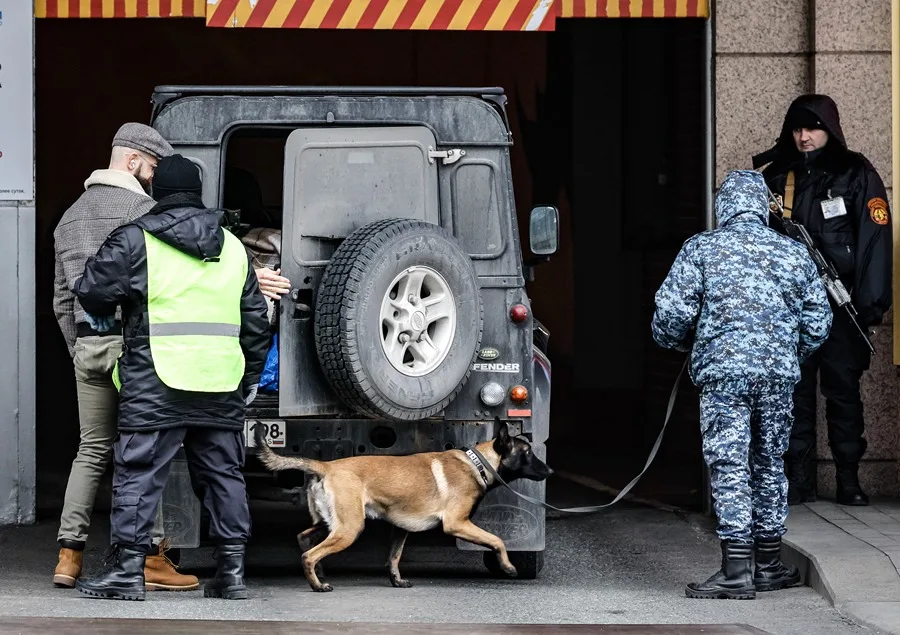
Russian Lieutenant General Yaroslav Moskalik, senior command of the General Staff, died this Friday due to the explosion of a car bomb in the Moscow region, according to the Russian Instruction Committee (CIR).
“According to preliminary data, Lieutenant General Yaroslav Moskalik died as a result of the explosion,” Svetlana Petrenko, a CIR spokeswoman, told local media.
Moskalik, deputy chead of the operations command of the General Staff of the Russian Armed Forces since 2021, died when approaching a car, a Volkswagen Golf, in which an explosive device was remotely detonated, according to Mash and Shot, two Telegram channels.
“The reason for the explosion was an explosive device. Fragments of the device were found at the scene of the accident,” a police source told the TASS agency.
The newspaper Kommersant suggests that a second person could have died in the attack, although other media do not report that possibility.
The sources cited by another channel, BAZA, speak of a gas cylinder as the reason for the explosion equivalent to 300 grams of trilite.
Other media believe that the cylinder that was in the car amplified the power of the explosive, which caused damage to the cars parked in the vicinity and the windows of adjacent buildings.
According to the Mash channel, the last owner of the car, which was parked in front of the portal of the building where the general lived, was an individual from the Ukrainian city of Sumi.
The Instruction Committee opened a criminal case for murder and illegal possession of explosives, while the spokeswoman for Foreign Affairs, María Zajárova, called the incident a “terrorist attack”.
The explosion took place in the courtyard of an urbanization built east of the Russian capital especially for retired military personnel, where a team of investigators, criminals and other agents has already been sent to supervise the site of the attack.
The Russian media offered images of the powerful explosion of tourism at the pass of the 59-year-old general, who had been included in the Ukrainian Mirotvorets list in which “the enemies of Ukraine” appear.
In December of last year, Lieutenant General Igor Kirilov, head of Russia’s radiological, chemical and biological defense, also died in a bomb attack while leaving his home.
According to the Gazeta.ru portal, in both cases its authors studied in detail the routine, from the schedule to the route, which the victims followed daily.
Then, Russian President Vladimir Putin described this attack as a “serious failure” by the security services, who held the agents of the Ukrainian secret services responsible.
“This (the murder of Kirilov), of course, means that our law enforcement officers and special services let these attacks pass. We need to improve the work and avoid such serious failures,” he said.
In turn, shortly after, Russia’s Federal Security Service (FSB) claimed to have thwarted a series of attacks against senior military leaders in the country and reported the arrest of four Russian citizens as part of the investigation.
“The Russian Federal Security Service thwarted a series of attacks against high-ranking military personnel of the Ministry of Defense who participate in the special military operation (in Ukraine), as well as against members of their families,” the agency said.
International
Social networks, protagonists in the farewell to Pope Francis for ‘selfies’ in front of his coffin
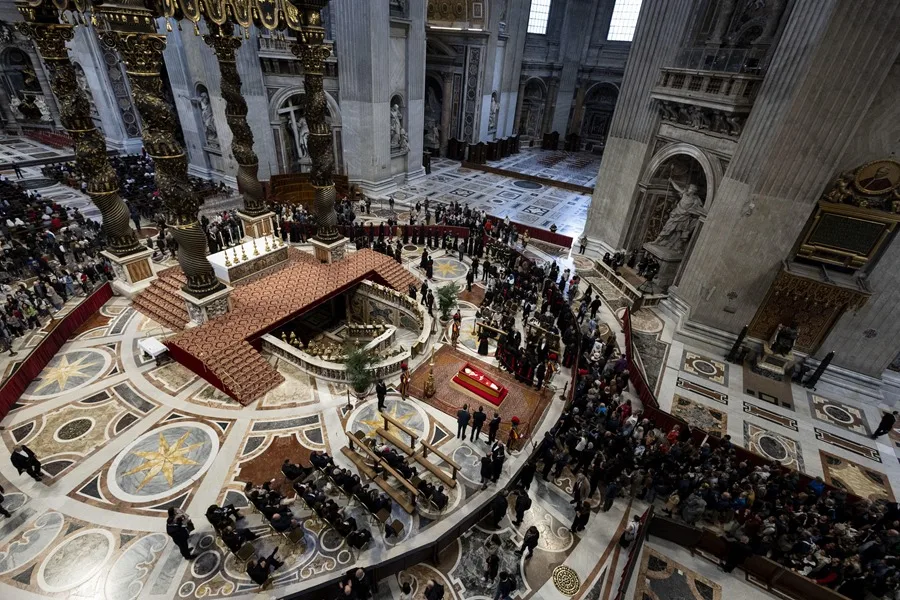
Social networks continue to be protagonists in the massive farewell to Pope Francis, who died last Monday at the age of 88, in the midst of a growing controversy over the ‘selfies’ that some visitors have published in front of his coffin in St. Peter’s Basilica.
More than a hundred thousand people have paraded these days through the Vatican temple to say goodbye to the Argentine pontiff, including many tourists and curious people who have “snealed” for photographs for the last time the most “viral” pope in history.
In recent hours, images have been released of people who, after hours of waiting, take advantage of the few seconds that the authorities let stop in front of the coffin to take a selfie next to Francisco’s body inside the coffin and then publish them on social networks.
This has unleashed criticism from many faithful, who denounce the lack of respect and solemnity in a context of mourning.
“The moment lived with so many people loses a lot of intimacy; the queues, the speed, blur that experience,” Pedro lamented to EFE, who traveled a whole night by car from the Spanish town of Murcia to say goodbye to the pope.
“Many come more to take pictures than to pray for the pope,” he added bitterly.
Francis’ closeness to young people and his active digital presence, especially through the official account @Pontifex in X (formerly Twitter), marked the style of a pope who knew how to adapt to contemporary languages and build bridges with the new generations.
Although the account was inaugurated by Benedict XVI in December 2012, it was Francisco who turned that channel into a common communication tool with millions of faithful.
Four days after his death and on the eve of the massive funeral expected for Saturday, social networks continue to mourn his death with an avalanche of tributes, messages of affection and content that consolidates the Argentine pontiff as the most “viral” and photographed in history.
Now, those same young people pay tribute to him from platforms such as TikTok and Instagram with emotional posts that compile his most remembered speeches and the iconic moments of his pontificate.
And even videos generated with Artificial Intelligence (AI) in which he is seen coming to heaven, received by his predecessors John Paul II and Benedict XVI, or even by Jesus, with whom he appears taking a picture “between the clouds.”
In the first 24 hours after the announcement of his death, more than 9.7 million content related to the pope and about 200 million interactions on social networks around the world were generated, according to an analysis by the SocialCom platform for Adnkronos.
A figure that surpassed other events of great global impact, such as the assassination attempt of US President Donald Trump in 2024.
Much loved by the new generations, Francisco managed to connect with her thanks to his direct tone, his simple language and his positive look towards the use of social networks, which he did not condemn or ignore during his pontificate.
-

 Central America4 days ago
Central America4 days agoNicaragua’s Ortega and Murillo Mourn Pope Francis, Acknowledge ‘Difficult’ Relationship
-

 Central America4 days ago
Central America4 days agoCardinal Rodríguez to Attend Funeral of Pope Francis: “He Was Very Dear to Me”
-

 International4 days ago
International4 days agoDominican Republic Declares Three Days of Mourning for Pope Francis
-

 International4 days ago
International4 days agoDHS Secretary Kristi Noem’s Purse Stolen in D.C. Restaurant Heist
-

 International3 days ago
International3 days agoPope Francis and Trump, a relationship of disagreements marked by migration
-

 International2 days ago
International2 days agoFrom the transfer of the coffin to the funeral, three days to say goodbye to Pope Francis
-

 International4 days ago
International4 days agoPope Francis: The Quiet Architect Behind the U.S.-Cuba Thaw
-

 International3 days ago
International3 days agoWithin Francis’ private wake: respect and prayer for the deceased pope
-

 International2 days ago
International2 days agoModi returns to India and shortens his visit to Saudi Arabia after a deadly attack in Kashmir
-

 International2 days ago
International2 days agoA very heterogeneous and divided conclave will elect the new pope
-

 International3 days ago
International3 days agoTrump’s emissary will visit Russia this week for consultations on the arrangement in Ukraine
-

 International3 days ago
International3 days agoCardinal Becciu’s enigma: will he enter the conclave?
-

 International3 days ago
International3 days agoThe pope last called the Gaza parish on Saturday and asked about the children
-

 International3 days ago
International3 days agoA candidate for the Supreme Court denounces an unequal dispute in the judicial election of Mexico
-

 International3 days ago
International3 days agoAmerican universities and colleges sign a letter against Trump’s policy
-

 International3 days ago
International3 days agoThe Government of Colombia presents twelve questions that it will propose in a popular consultation to promote its reforms
-

 International2 days ago
International2 days agoEl Salvador formalizes the proposal for the exchange of Venezuelan deportees, according to Bukele
-

 International3 days ago
International3 days agoBurma’s military junta extends ceasefire until April 30 due to the earthquake
-

 International2 days ago
International2 days agoMaradona’s house arrest is again a focus of tension in the trial for his death
-

 International2 days ago
International2 days agoThe Peruvian Public Ministry denounces the former attorney general for an alleged corruption case
-

 International2 days ago
International2 days agoA judge orders the Trump Government to restore Voice of America services
-

 International3 days ago
International3 days agoRoyal quinoa, the superfood that grows in front of the largest salt flat in the world in Bolivia
-

 International20 hours ago
International20 hours agoThe Arab League supports Hamas handing over control of Gaza and weapons to the Palestinian Authority
-

 International2 days ago
International2 days agoDonald Trump will visit Saudi Arabia, Qatar and the United Arab Emirates in mid-May
-

 International3 days ago
International3 days agoChurch charges ceased or resigned in the papacy of Francis for cases of pedophilia
-

 International3 days ago
International3 days agoInternational leaders begin to confirm their presence at Pope Francis’ funeral
-

 International20 hours ago
International20 hours agoThe Pope’s funeral procession through the center of Rome worries the Italian authorities
-

 International2 days ago
International2 days agoThe president of the World Bank underlines his intention to lift his veto on nuclear energy
-

 International20 hours ago
International20 hours agoMigrants want to stay on Mexico’s southern border because of Sheinbaum’s industrial plan
-

 International20 hours ago
International20 hours agoA group of the poor and a delegation of migrants will participate in the funeral and burial of the pope on Saturday
-

 International2 days ago
International2 days agoMarco Rubio reorganizes the State Department to eliminate offices and jobs
-

 International2 days ago
International2 days agoThe Brazilian Supreme Court opens trial against six others accused of leading the coup attempt
-

 International2 days ago
International2 days agoA judge in the United States stops the deportation to El Salvador of a hundred Venezuelans
-

 International20 hours ago
International20 hours agoThe pope’s doctor reveals his last moments of life and that he wanted to “die at home”
-

 International20 hours ago
International20 hours agoFrom email to marriage: the day Pope Francis married a Uruguayan couple
-
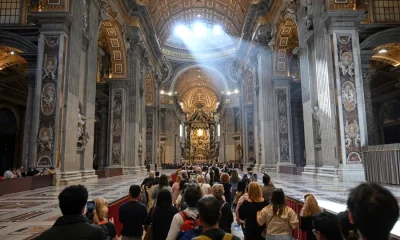
 International1 hour ago
International1 hour agoAbout 150,000 people say goodbye to the pope in St. Peter’s Basilica before the funeral
-
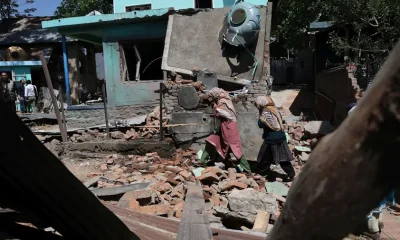
 International15 mins ago
International15 mins agoIndia destroys the homes of the alleged attackers in Kashmir with excavators
-
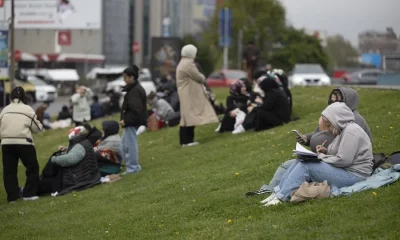
 International1 hour ago
International1 hour agoA 4.5 magnitude earthquake shakes the coast of the Aegean Sea in Turkey without leaving injuries or damage
-

 International21 mins ago
International21 mins agoPutin and Witkoff address possible direct negotiations between Russia and Ukraine
-
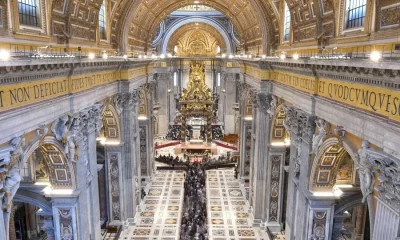
 International20 mins ago
International20 mins agoThe protocol for the funeral of Pope Francis, a delicate diplomatic work














